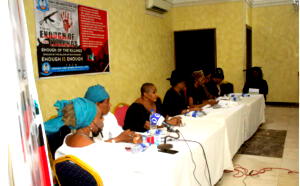This piece continues today the story of Chief Eyo Ita Esua who organised the first post-independence general elections in Nigeria He died ...

This piece continues today the story of Chief Eyo Ita Esua who organised the first post-independence general elections in Nigeria
He died seven years after leaving the office in Calabar in 1973. His children still idolise the outstanding qualities of Chief Esua till today in Calabar.
And the man who took over from Chief Esua, that is, Chief Michael Ani in 1976, also died six years after leaving the job on December 18, 1985 also in Calabar. Justice Ephraim Omorose Ibukun Akpata (1927-2000) who conducted the 1999 general elections died in office during his tenure on January 8, 2000 in Abuja.
Sir Abel Goubadia (1932-2011) who took over from Justice Akpata and conducted the 2003 Presidential election died seven year after leaving office in Benin on February 4, 2011.
Professor Maurice Iwu who took over from Sir Goubadia, has a fraud charge against him by the Economic and Financial Crime Commission, EFCC, at the Federal High Court now.Professor Eme Awa (1921-2000) was sacked from the office by General Ibrahim Babangida. Also sacked was Professor Humphrey Nwosu, who conducted the freest and fairest election in the country on June 12, 1993.
In fact, the presidential election of June 12, 1993 was annulled.Professor Okon Edet Uyafrom Oron, Akwa Ibom State, the hometown of my friend, Senator Victor Akan, who took over from Professor Nwosu, was not able to conduct any election before he was removed when General Sani Abacha assumed power. Professor Uya later became Deputy Vice Chancellor and acting Vice Chancellor of the University of Calabar. The last undergraduate course he taught was Atlantic Slave Trade.
Under Chief Summer Karibi Dagogo-Jack(90) from Abonnema, Akuku-Toru LGA, Rivers State, there was no presidential election. The commission under him conducted elections for the local government councils and the National Assembly but overstepped its bounds of its authority in some cases. He too was sacked after General Abacha died.
The only consolation is Professor Attahiru Muhammadu Jega (63) who is free now. If we are to believe in the Kebbi-born professor, he is now talking about restructuring.
ALSO READ: CACOVID breaks silence on palliatives in warehouses
Except Professor Nwosu, who is equally a friend of Chief Fab Uche, a friend of mine, none of these men wrote their memoirs.
On Friday November 23, 1979, the Chairman of the then Federal Electoral Commission, FEDECO, Chief Michael Okon Nsa Ani,(November 30, 1917 to December 18, 1985) finally granted my outstanding request.
He granted me an exclusive interview on his last day in office at Onikan in Lagos, in the presence of the Secretary of the Commission, Alhaji Ahmed Kurfi and the National Electoral Commissioner on information, Alhaji Alade Odunewu (1927-2003) alias Alla-De.
His verdict on his job was that “being FEDECO chairman is the most hazardous and risky job in the country; how do you adjudicate in a chaotic situation. I am happy its over now”. Chief Ani thanked me for the coverage of his tenure, shook my hands and drove off. I never saw him again. Chief Ani should know about the hazard of the job, for he was the only man reappointed for the job.
The late Secretary to the Government of the Federation, Chief Allison Akene Ayida (1930-2018) in a lecture in Calabar on July 26, 1989, gave insight into how Chief Ani was appointed and reappointed as Chairman of the electoral body.
On that day he declared: “It seems those halcon days for the civil service which Chief Michael Ani and his colleagues tested and nurtured, are gone forever.
We are here to honour a man who spent the better part of his life defending the integrity of the public service as the Permanent Secretary, Federal Ministry of Establishments and Service Matters(Personnel Management to the new generation), and Member of the Federal Public Service Commission.
“He is better known in Calabar as the Administrator for the Liberated Areas of South-Eastern State during the civil war, and the Founding Father of the South-Eastern State Civil Service as its first Secretary to the Military Government and Head of Service.
He attained international recognition when he was appointed Member of the International Civil Service Commission in 1974, having previously served on the UN panel of Experts on Public Administration for setting up the proposed Federal Service for Uganda, Kenya and Tanzania in 1963.
“When I was appointed to act as Permanent Secretary to the Federal Ministry of Economic Development, 1963, I was the youngest Permanent secretary in the Federation. It was part of an experiment to try out the then-new breed in the civil service as PermSecs. I had to look up to senior colleagues such as the late Chief Ani for guidance and leadership. We received their full co-operation.”
To be concluded…
The post INEC job and the risk element (2) appeared first on Vanguard News.

No comments